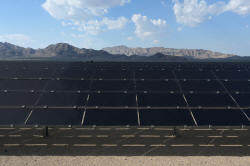Tariffs, seizures expose U.S. solar industry's
vulnerability to imports
 Send a link to a friend
Send a link to a friend
 [September 28, 2021] By
Nichola Groom [September 28, 2021] By
Nichola Groom
(Reuters) -Cheap imports have fueled the
U.S. solar industry's dramatic growth for years. Now, mounting trade and
transport issues is exposing that dependence as a vulnerability, slowing
shipments and putting big projects at risk, according to industry
representatives.
Tighter availability of foreign panels could hurt the booming industry
and set back President Joe Bidenís effort to decarbonize the nationís
power sector, a centerpiece of his plan to combat climate change. Some
90% of U.S. solar panels are made overseas, according to the U.S. Energy
Information Administration.
Among the issues clouding solarís outlook is an attempt by U.S.
authorities to block shipments of panels containing components
potentially derived from forced labor in China's Xinjiang region.
The Biden administration imposed an import ban targeting China's Hoshine
Silicon Industry Co in June and since then, hundreds of megawatts of
panels have been detained at the border, according to an industry
source.

U.S. Customs and Border Protection would not disclose the amount of
solar products it has detained. China has denied that its solar
components are produced with forced labor.
At the same time, a tiny domestic solar manufacturing industry has
submitted an anonymous petition calling on the U.S. Commerce Department
to impose new tariffs on some imported panels over accusations of
dumping products at artificially low prices.
The Commerce Department is expected to decide this week whether to
consider the request, which would affect imports from Vietnam, Thailand,
and Malaysia.
If imposed, those tariffs would jeopardize 18 gigawatts of solar
projects by 2023, or enough to power more than 3 million homes,
according to the U.S. Solar Energy Industries Association (SEIA).
The small group of domestic solar manufacturers say they remain
anonymous because disclosure of their names "could lead to retribution
against these companies and cause substantial harm." Tim Brightbill, the
group's attorney, said the trade group's claims were "wildly
overstated."
U.S. solar developers say, however, that suppliers in Southeast Asia
have already cut sales to the United States over fears their panels
could get hit with retroactive levies if the Commerce Department
proceeds.
SUPPLY SQUEEZE
Maritime shipments of solar modules into the United States were already
down 11% in August compared to 2020, and down 2% for about the first
three weeks of September, according to data from financial information
provider S&P Global.
[to top of second column] |

Solar panels are seen at the Desert Stateline project near Nipton,
California, U.S. August 16, 2021. Picture taken August 16, 2021.
REUTERS/Bridget Bennett/File Photo

"We are getting hit right now pretty hard," Markus Wilhelm, chief executive of
solar project developer Strata Solar, said during a press call organized by SEIA
on Monday. "We are completely dependent on a global supply chain, so we are a
little bit more vulnerable."
"We can't get module manufacturers today to sign purchase orders that we need to
deliver projects in the near term," George Hershman, president of solar
contractor Swinerton Renewable Energy, said on the call.
The issues compound a global supply squeeze stemming from the coronavirus
pandemic that has already hit other industries with rising costs and delays,
impacting everything from bicycle sales to the availability of smartphones.
The U.S. solar industry earlier this month said that its installations were
running at a record pace despite the shipping bottlenecks and jump in costs, but
that the new threats raised the risk of a future slowdown.
Top renewable energy developer Nextera Energy Inc has led the push against the
new duties in extensive filings with the Commerce Department, with support from
EDF Renewables Inc, Clearway, Invenergy and Enel Green Power.
In addition to the immediate threat of new duties, the U.S. International Trade
Commission will decide by the end of this year whether to extend tariffs imposed
by the Trump administration in 2018 on all foreign-made panels.
Five domestic producers requested the extension, including the U.S. arms of
Korea's Hanwha Q CELLS and LG Electronics.
One of the world's largest panel makers, JinkoSolar, has been caught in the
crosshairs of both the border seizures and the potential for new tariffs.
The company said earlier this month that some of its solar panels had been
stopped at the border by U.S. Customs. The company is also among the Chinese
companies targeted by domestic petitioners seeking new tariffs.

Roth Capital Partners analyst Philip Shen cut his price target on JinkoSolar's
stock to $51 from $58 on Sept. 16, citing the "one-two punch."
JinkoSolar did not respond to a request for comment.
(Reporting by Nichola Groom; Editing by Aurora Ellis)
[© 2021 Thomson Reuters. All rights
reserved.] Copyright 2021 Reuters. All rights reserved. This material may not be published,
broadcast, rewritten or redistributed.
Thompson Reuters is solely responsible for this content. |